Key takeaways:
- Conservation projects are essential for preserving biodiversity and require personal commitment and reflection on one’s impact on the environment.
- Unique volunteering opportunities can be found through local universities, NGOs, and networking, fostering a community of passionate individuals.
- Effective preparation, including research and packing emotionally, enhances the volunteer experience and fosters meaningful engagement with conservation causes.
- Sharing experiences and challenges in conservation can inspire others and spark curiosity about environmental protection.
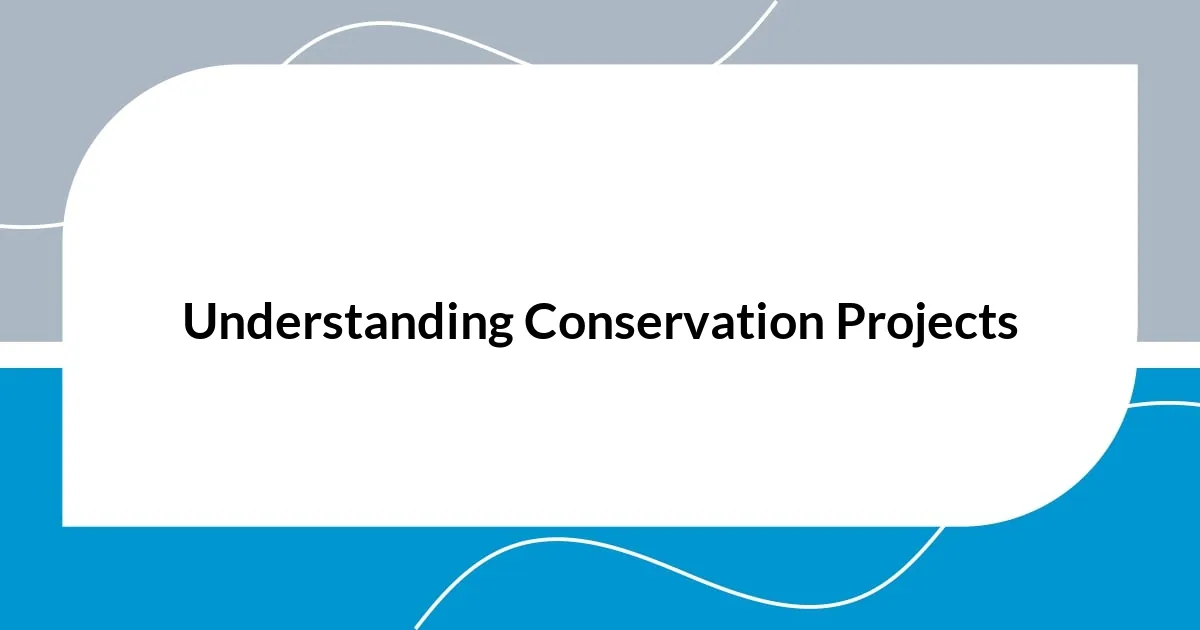
Understanding Conservation Projects
Conservation projects are often more than just a collection of tasks; they encompass a deep commitment to preserving our planet’s biodiversity. I still vividly remember the first time I stood in the middle of a sunlit forest, surrounded by experts, learning about the delicate balance of ecosystems. How often do we pause to consider the intricate relationships that sustain our natural world?
At their core, these initiatives aim to protect endangered species and restore habitats affected by human activity. In one of my experiences, we worked tirelessly to rehabilitate a local wetland, and the satisfaction of witnessing wildlife returning to their natural habitat was truly exhilarating. It made me wonder, have we fully grasped the rippling effects our actions have on the environment?
Understanding these projects requires us to recognize that every small effort contributes to a larger goal. When I volunteered at a conservation site, I often reflected on how one person’s determination can ignite change. I found myself asking others, “What legacy do we want to leave for future generations?” This question can be a powerful motivator, don’t you think? Each movement towards conservation opens up a pathway for personal and communal growth, intertwining our fates with the earth’s health.
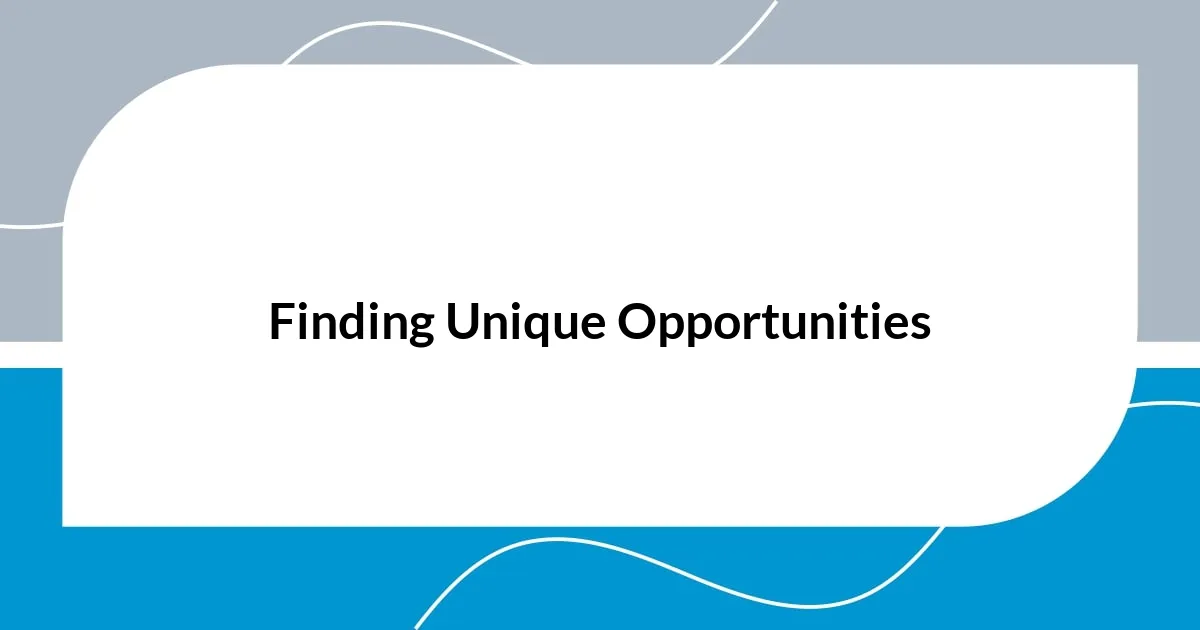
Finding Unique Opportunities
Finding unique opportunities for conservation volunteering can sometimes feel like searching for hidden treasures. After dedicating time to research, I stumbled upon sites that were completely off the beaten path. I remember vividly how excited I felt when I discovered a small, community-run project focused on rescuing sea turtles. It was one of those moments when I realized that the most rewarding experiences are often found in the least expected places.
To help others in their quest for unique opportunities, here’s a quick list of tips that worked for me:
- Explore Local Universities: Many academic institutions engage in regional projects and frequently seek volunteers for their studies.
- Connect with NGOs: Smaller, lesser-known non-governmental organizations often have specific conservation initiatives that don’t get as much attention as larger ones.
- Use Volunteer Platforms: Websites like Workaway or WWOOF offer options that emphasize unique conservation experiences.
- Network with Fellow Volunteers: Sometimes, the best leads come from talking to others who share your passions.
- Attend Conservation Events: Workshops, seminars, or local meetups can introduce you to niche projects looking for hands-on help.
Finding these unique opportunities not only supplements your own knowledge but also fosters a vivid community of passionate individuals eager to make a difference, just like I wanted to do.
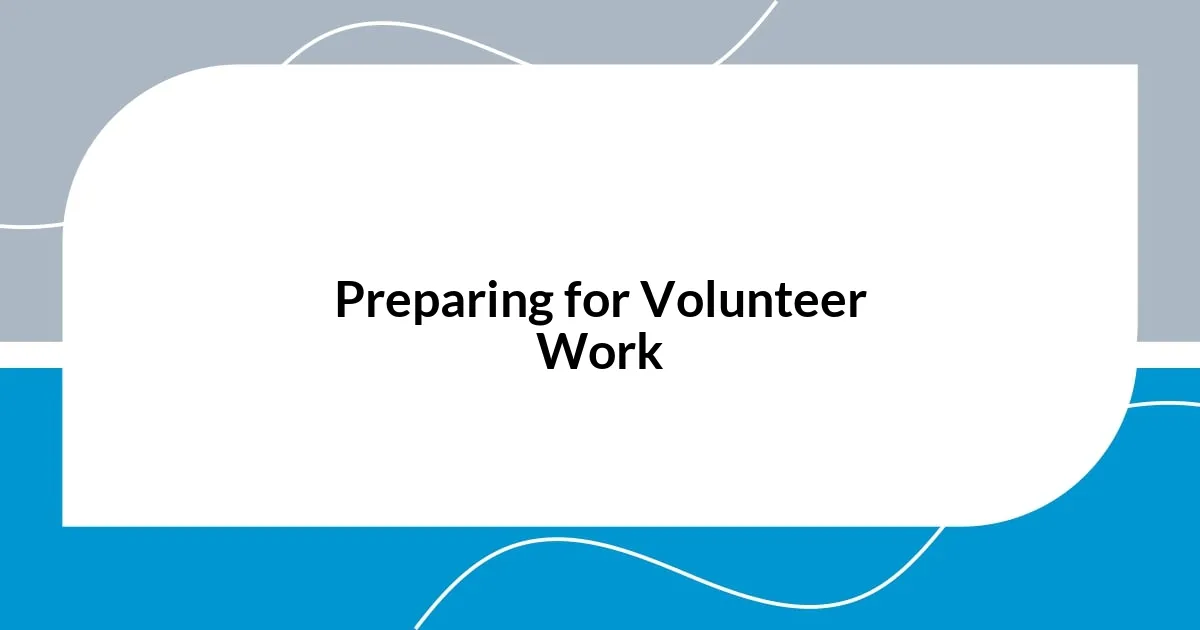
Preparing for Volunteer Work
Preparing for volunteer work in conservation is an exciting journey that requires thoughtful consideration. I still remember the sleepless nights filled with anticipation as I packed my gear, wondering if I had everything I needed. Taking inventory not just of my physical supplies but also my mental readiness was crucial. Reflecting on what I would bring to the project in terms of skills, enthusiasm, and collaboration set the tone for my experience.
Researching the specific project made a world of difference. I always felt a deeper connection to the cause when I knew the background and objectives of the initiative. By familiarizing myself with the local environment and its challenges, I was able to engage more meaningfully. I recall learning about the effects of plastic pollution on marine life before joining a coastal cleanup. This knowledge not only fueled my passion but also allowed me to educate others, making the work feel even more impactful.
A list can be a helpful starting point when preparing for volunteer work. In my own experience, I wrote down essential items like sturdy boots, reusable water bottles, and sunscreen, but I also included personal reminders. For instance, I noted to keep an open heart and an open mind, ready to embrace new challenges and friendships. Each piece of preparation contributes to creating a fulfilling experience that goes beyond tasks to touch lives and inspire change.
| Preparation Step | Personal Insight |
|---|---|
| Research the project | Informed my engagement and connection with the cause. |
| Create a checklist | Helped in feeling organized and ready for any adventure. |
| Network with past volunteers | Gained invaluable tips and emotional perspectives, enhancing my readiness. |
| Pack emotionally | Remember to bring an open heart for unexpected challenges and bonds. |
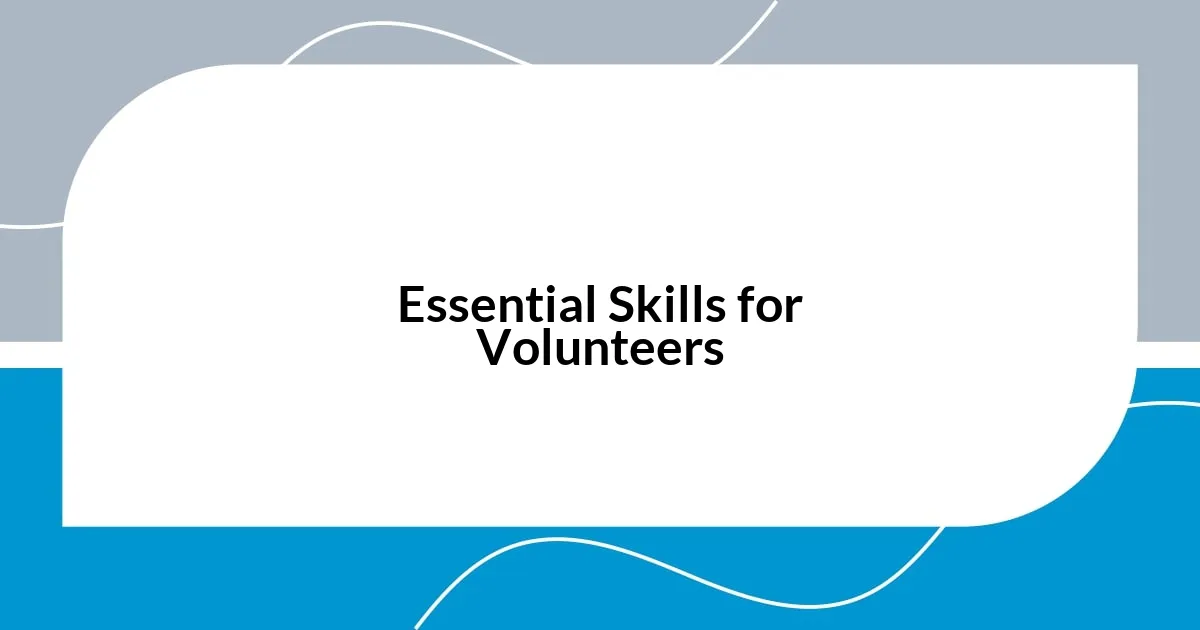
Essential Skills for Volunteers
Volunteering in conservation requires a unique blend of skills to truly make an impact. One essential skill I found invaluable was adaptability. I remember a day on a wildlife rescue mission where everything seemed to go awry. The weather turned, and our plans shifted from rescuing seabirds to repairing a makeshift shelter. Embracing that change, instead of being frustrated, helped me see the bigger picture. How could I have approached that day differently if I hadn’t been flexible? The answer was simple: I wouldn’t have enjoyed the experience as much.
Another skill that often gets overlooked is effective communication. Whether it’s sharing ideas with fellow volunteers or educating the public about conservation practices, clear communication is crucial. I had an experience during a community outreach event where my attempt to explain the importance of biodiversity sparked a lively discussion. It dawned on me how vital it was to translate complex concepts into relatable terms. Have you ever tried to explain something you’re passionate about only to lose your audience’s interest? It’s a reminder that engaging storytelling can be just as essential as data.
Finally, a genuine passion for the environment stands out as an essential skill. I remember standing on a beach at sunset after a long day of conservation work, feeling utterly exhausted yet profoundly fulfilled. It was in those moments, surrounded by like-minded individuals, that I understood the importance of commitment. What drives you to volunteer? A personal connection or a desire to help can propel your efforts and amplify your impact in ways you might never expect.
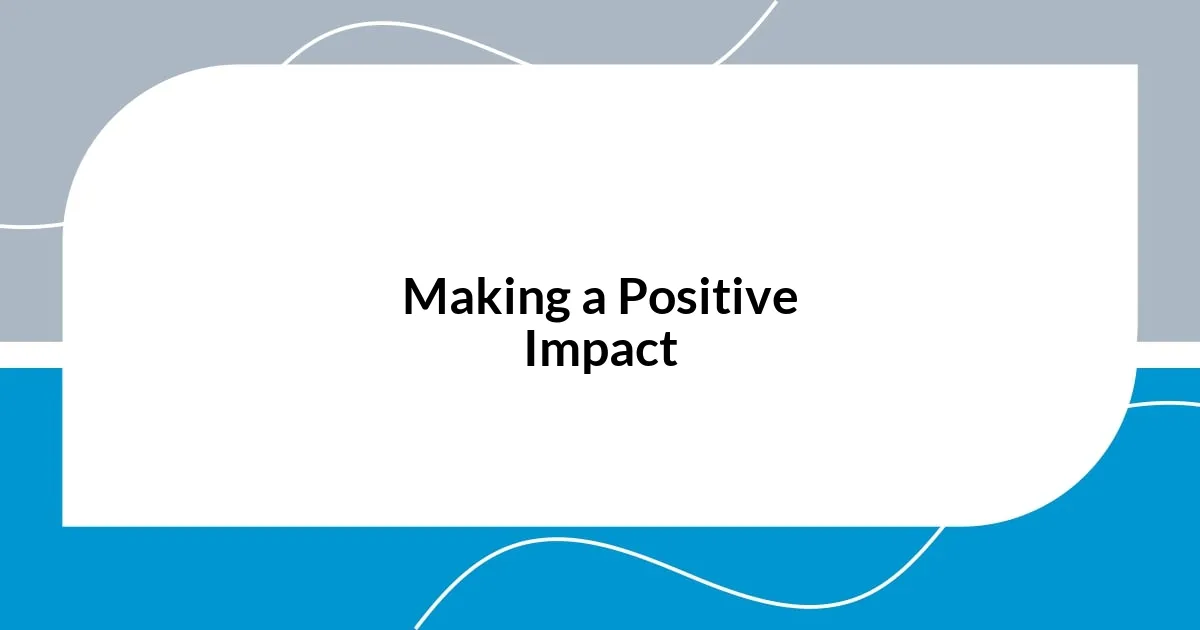
Making a Positive Impact
Making a positive impact through conservation work has a way of transforming not just the environment, but our own perspectives as well. I recall a moment during a reforestation project when we planted indigenous seedlings in a deforested area. Watching those tiny saplings go into the soil felt like I was nurturing a bit of hope for the future. It hit me then that every little action counts; each seed was a promise for a healthier ecosystem, and that thought brought immense fulfillment to my heart.
One standout experience for me was when I volunteered for a coral restoration initiative. We spent days under the sun, carefully reattaching fragments of coral to damaged reefs. The joy in the eyes of the marine biologist when she saw our progress was infectious. Have you ever felt the sheer power of teamwork in achieving something beyond what you could do alone? That day, I not only felt like part of a community but also a key player in the ongoing battle against climate change.
Reflecting on my conservation journey, I’ve learned that the impact we make extends beyond the immediate projects. I once led a workshop on plastic waste reduction, sharing tips I’d picked up during previous projects. It was deeply rewarding when participants approached me afterward to say they’d been inspired to make changes in their own lives. The conversations sparked that day reminded me that each interaction can ripple out, creating changes we might never see but are undoubtedly part of. What could be better than knowing that your passion has the power to ignite change in others?
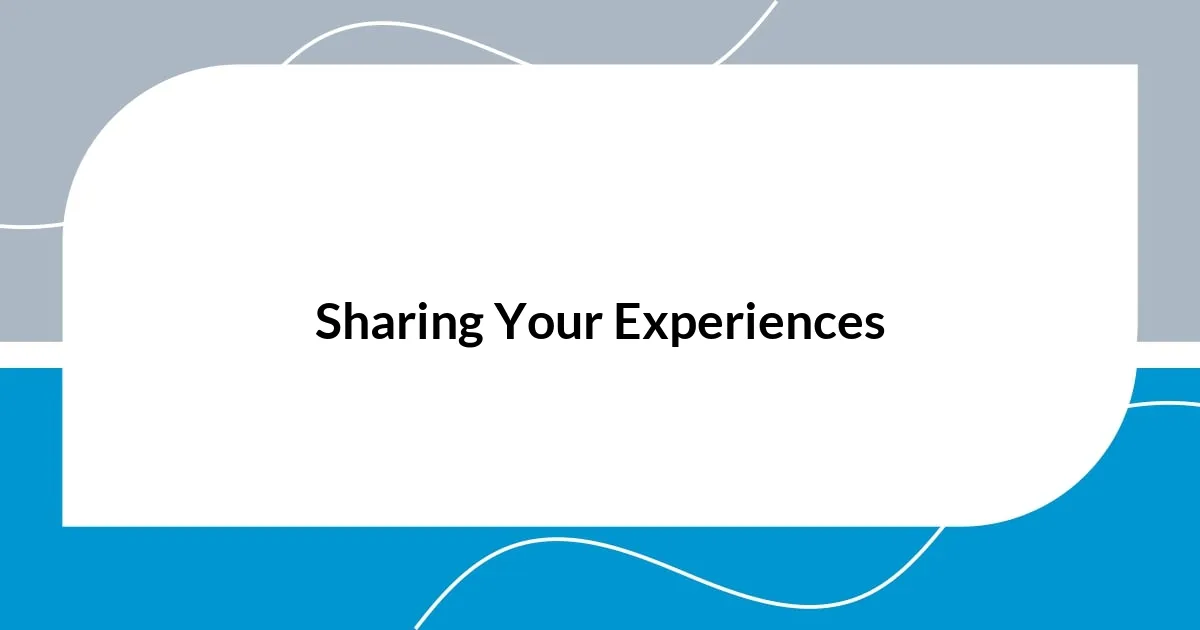
Sharing Your Experiences
Sharing your experiences in conservation can be a powerful way to inspire others. When I returned home after a month of working on a sea turtle nesting project, I felt an overwhelming urge to tell my friends and family what I had witnessed. The joy I felt watching hatchlings make their first trek toward the ocean was indescribable. Have you ever been so moved that you couldn’t wait to share your story? That excitement for storytelling makes each interaction a chance to educate and motivate.
Sometimes, sharing isn’t just about the highs but also about the challenges. I recall a particularly tough day when we faced setbacks in data collection during a wildlife survey. As I talked about the obstacles with my fellow volunteers, we found comfort in laughter and camaraderie. It made me reflect: why do we often shy away from discussing tough moments? In reality, these shared challenges can foster deeper connections and create a more authentic dialogue about what conservation truly involves.
I’ve also found that platforms like social media offer a unique opportunity to extend our reach. After posting photos and updates from a conservation expedition, I was amazed at the responses from friends who expressed newfound interest in protecting the environment. It reminded me of how powerful our voices can be; engaging a wider audience can spark curiosity and encourage action. How many people can we touch with our stories? The potential seems limitless when we start sharing our journeys.
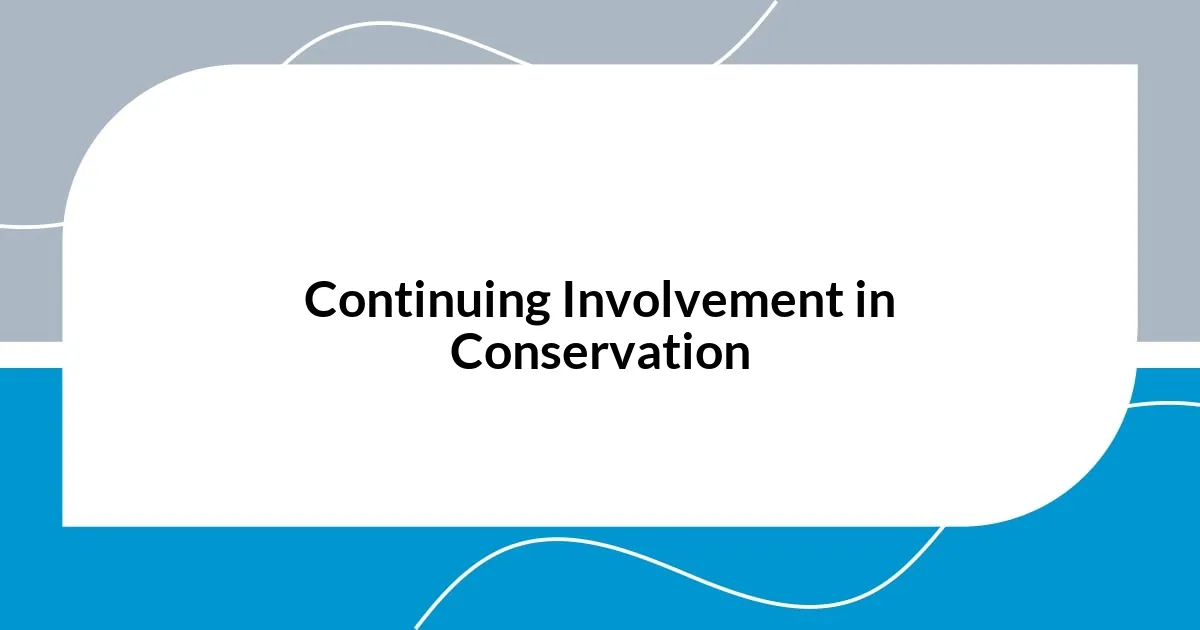
Continuing Involvement in Conservation
Continuing my involvement in conservation has led me to embrace a more proactive role. I remember when I decided to join a local eco-committee after my initial volunteering experiences. Each meeting felt like I was part of a bigger mission. It wasn’t just about discussing ideas; it was about taking actionable steps toward sustainable practices in our community. Have you ever felt that surge of motivation when you realize that your voice matters?
I’ve also taken up mentoring young volunteers, guiding them through their own conservation journeys. It’s incredible to see their enthusiasm and passion. I recall one mentee who was initially unsure about where to start. After sharing my experiences and providing some resources, they went on to organize their own clean-up event. How rewarding is it to witness someone grow in confidence and take initiative? It reaffirms my belief that we all have the potential to inspire change in each other.
Participating in ongoing conservation efforts allows me to explore new initiatives and challenges. Just last month, I joined a citizen science project that focuses on monitoring local bird populations. The thrill of witnessing migratory patterns firsthand was mesmerizing. Do you ever find yourself captivated by the small wonders of nature? I encourage you to consider how engaging in such projects can deepen your connection to the environment and keep the momentum of conservation alive.